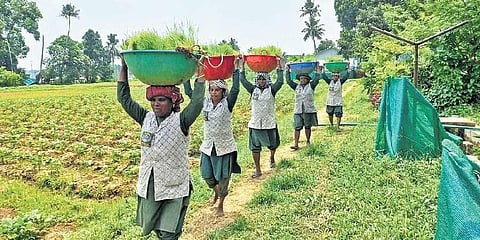

KOCHI: The need to remove or reduce greenhouse gases in the atmosphere has become the need of the hour. Individuals and societies need to act to balance out their emissions through carbon offsetting, or contributing financially to projects that decrease greenhouse gas levels. In this context, the announcement by the State Seed Farm in Aluva of achieving carbon-neutral status showed be viewed as a good starting point. It is the first farm in the country to achieve the feat.
The official declaration will be made on December 10 by Chief Minister Pinarayi Vijayan. The farm was deemed carbon neutral following a study under the leadership of P O Nameer, dean of Kerala Agricultural University College of Climate Change and Environmental Science. During the baseline survey, carbon emissions and carbon storage were assessed. As part of the study, it was found that the farm had 43 tonnes of carbon emissions and 213 tonnes of carbon storage. The figures indicate that the farm is not only carbon neutral but also carbon negative.
At a time when stubble burning by farmers in Punjab and Haryana is a much-discussed topic, the achievement by the Aluva State Seed Farm is a model. “A carbon-neutral farming practice involves absorption of all the carbon that gets released during various agriculture practices in the soil itself,” said Lissymol J Vadakuttu, assistant director of agriculture, State Seed Farm Aluva.
“The one way to do this is to avoid using fossil fuels and energy-consuming equipment,” she said. According to her, the farm has been following this method of agriculture since 2012. “It is the only organic seed farm under the state government,” she added. The seed farm doesn’t use chemicals during any stage of the cultivation process. “We practice mixed farming that has native breeds of cow, goat, chicken and ducks along with aquaculture, azolla cultivation and production of vermicompost,” said Lissymol.
Paddy is the main crop at the farm. Besides the high-yielding paddy, the farm also cultivates and provides farmers with the seeds of varieties like rakthashali, njavara, chottadi, Japan violet and pokkali,” she said. According to her, due to the practice of mixed farming, the use of pesticides has been done away with at the farm. “Mixing up five different varieties has led to a huge reduction in pest attacks and also diseases,” she said.
The farming of cows, goats, ducks, chicken, fish, bees, azolla and vermicompost has led to the reduction of waste generation. “Agriculture waste is converted into compost and used to fertilise the fields. So, other than neem oilseed cake, calcium carbonate and bone meal, we don’t have to buy any other fertiliser from outside,” she said. Poultry like ducks is used to control the pests in the paddy. “Due to the continuous movement of water in the fields caused by the ducks paddling around, no greenhouse gases are produced,” she added. Since fertilisers are produced on the farm itself, cow dung is not used directly in the fields. “Hence, this reduces the release of methane gas into the atmosphere,” the official said.
“We don’t burn agriculture waste. We don’t buy cattle feed from outside. The animals are fed fodder, grass, hay and barn produced on the farm,” she added. As a part of becoming a complete carbon-neutral farm, solar panels have been installed on the roof of the farm. “The electricity produced is used to meet the power needs of the farm office,” Lissymol said.